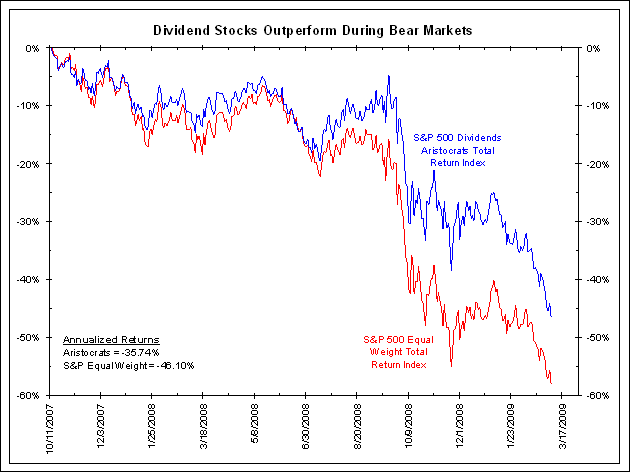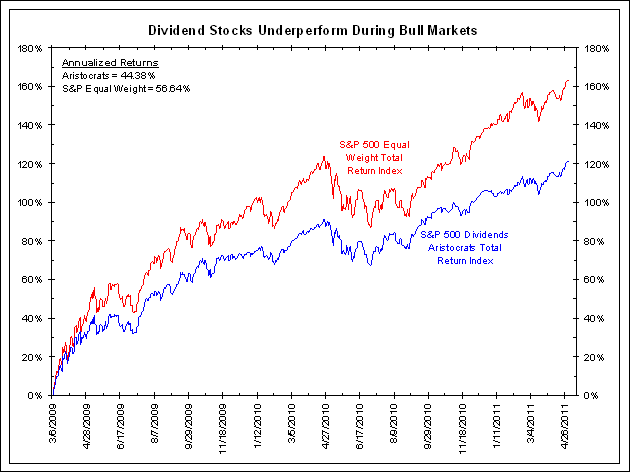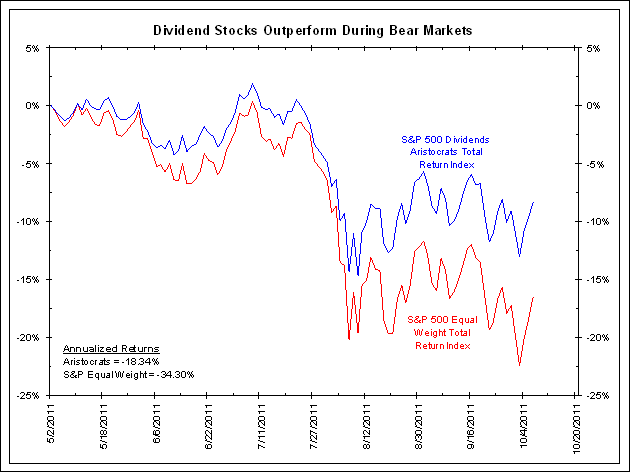Seeking Alpha – Why Dividends Matter In A Changing Market [1]Comment
Lately, it seems that dividend investing has become all the rage. Articles are being written at just about every financial site, talking about dividends. When you look at Money Watch, MSN Money, Kiplinger, Money Magazine, Forbes, Smart Money, and even here at SA, there is no shortage of dividend investing commentary…Mark Hulbert has written an article that I think you might find interesting. He says:
Believe it or not, the stock and bond markets are behaving in a way that, with only one exception at the depths of the 2008-2009 credit crisis, they have not since 1958—53 years ago: The stock market’s dividend yield is now above the interest rate on the 10-year Treasury note.
With dividend yields outpacing the 10 year Treasuries, perhaps we are beginning to see a paradigm shift back to that pre-1958 market model. Investors can now find companies that have a history of paying dividends, companies that are increasing those dividends annually, and companies that have the earnings power to continue making those dividend payments. Dividend investing may very well become the norm moving forward.
In our current uncertain and volatile environment, investors are seeking safety. So, it should come as no surprise that dividend stocks have gained in popularity especially since many blue-chip stocks pay higher dividend yields?
However, any case for a new era of dividend investing may be a bit overstated. Dividend stocks should simply be viewed as a slightly less risky form of stock investing. As such, we should expect dividend-paying stocks to outperform during bear markets and underperform during bull markets.
By comparing the S&P Dividends Aristocrats Total Return Index [2] and the S&P Equal Weight Total Return Index [3], we can see this is indeed the case. The S&P Dividends Aristocrats Index measures the performance of stocks in the S&P 500 that have consistently increased dividends for at least 25 consecutive years. The index is equally weighted, so we compare its total return to that of the S&P 500 Equal Weight Index.
During the bear market from October 11, 2007 to March 6, 2009, dividend-paying stocks outperformed the S&P 500 Equal Weight Index by 11.6%. On an annualized basis, dividend stocks returned -35.74% versus -46.10% for the S&P Equal Weight Index.
.
.
During the bull market from March 6, 2009 to May 2, 2011, dividend-paying stocks underperformed the S&P 500 Equal Weight Index by 42.4%. On an annualized basis, dividend stocks returned 44.38% versus 56.64% for the S&P Equal Weight Index.
.
.
Finally, during the bear market from May 2, 2011 through last Thursday’s close, dividend-paying stocks outperformed the S&P 500 Equal Weight Index by 8.19%. On an annualized basis, dividend stocks returned -18.34% versus -34.30% for the S&P Equal Weight Index.
.
To be sure that these past few bull/bear markets were the rule and not the exception, we also compared total returns of these two indices on all days when the S&P Total Return Index was up versus all days when the S&P Total Return Index was down. With data going back to the beginning of 1990,dividend-paying stocks returned an average of 66 basis points per day on days the stock market was up. The S&P Equal Weight Index returned an average of 77 basis points per day on those same days. On days the stock market was down, dividend-paying stocks returned an average of -67 basis points per day. The S&P Equal Weight Index returned an average of -80 basis points per day.
Rather than being concerned with reaching for yield, the charts and data above suggest dividend stocks outperform during bear markets and underperform during bull markets. However, if investors are savvy enough to know which way the market was heading in general, why even bother distinguishing between dividend-paying stocks and non-dividend-paying stocks?
Source:
Bianco Research, LLC.
Rather than being concerned with reaching for yield, the charts and data above suggest dividend stocks outperform during bear markets and underperform during bull markets. However, if investors are savvy enough to know which way the market was heading in general, why even bother distinguishing between dividend-paying stocks and non-dividend-paying stocks?
Source:
Bianco Research, LLC.




No comments:
Post a Comment